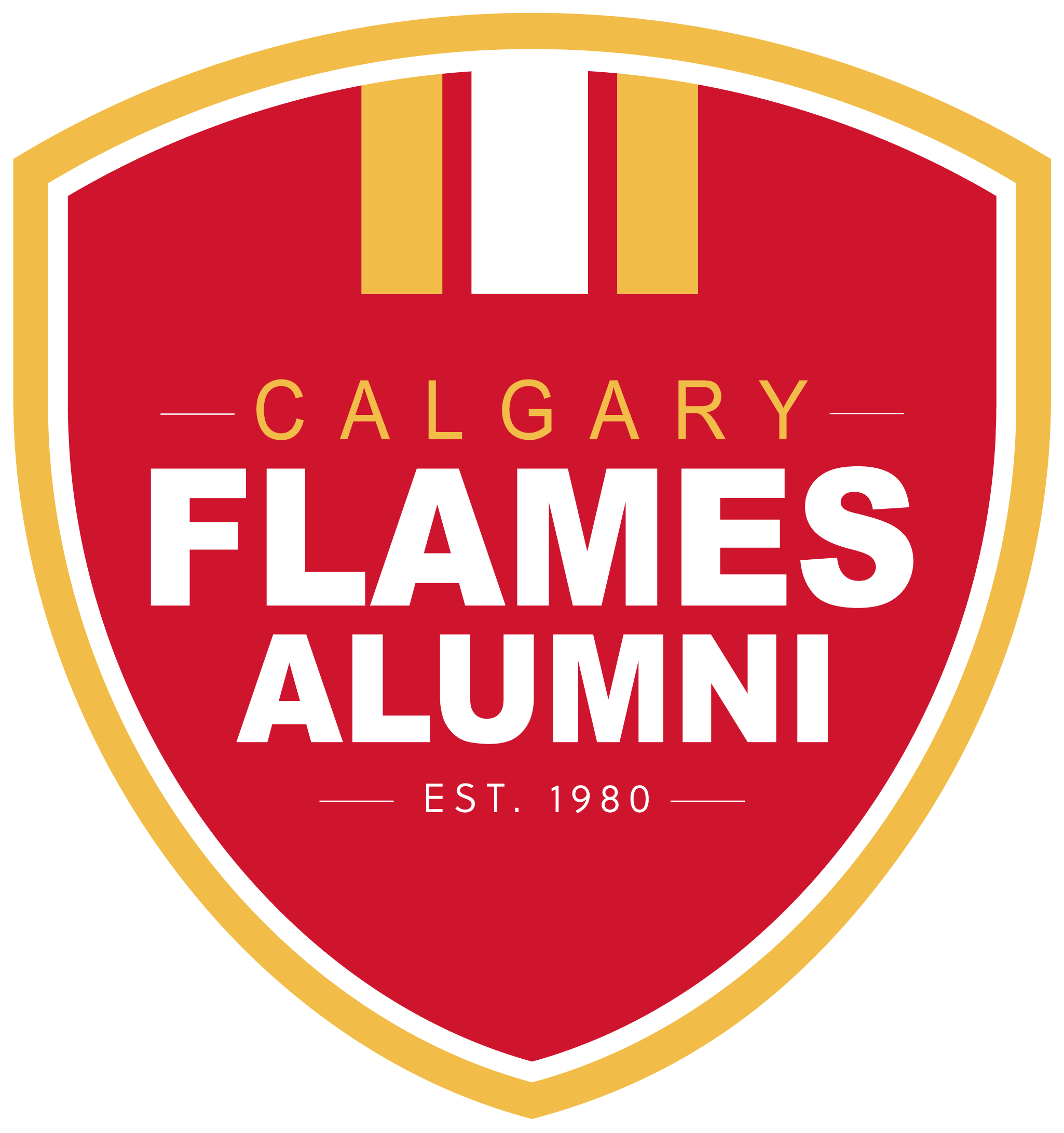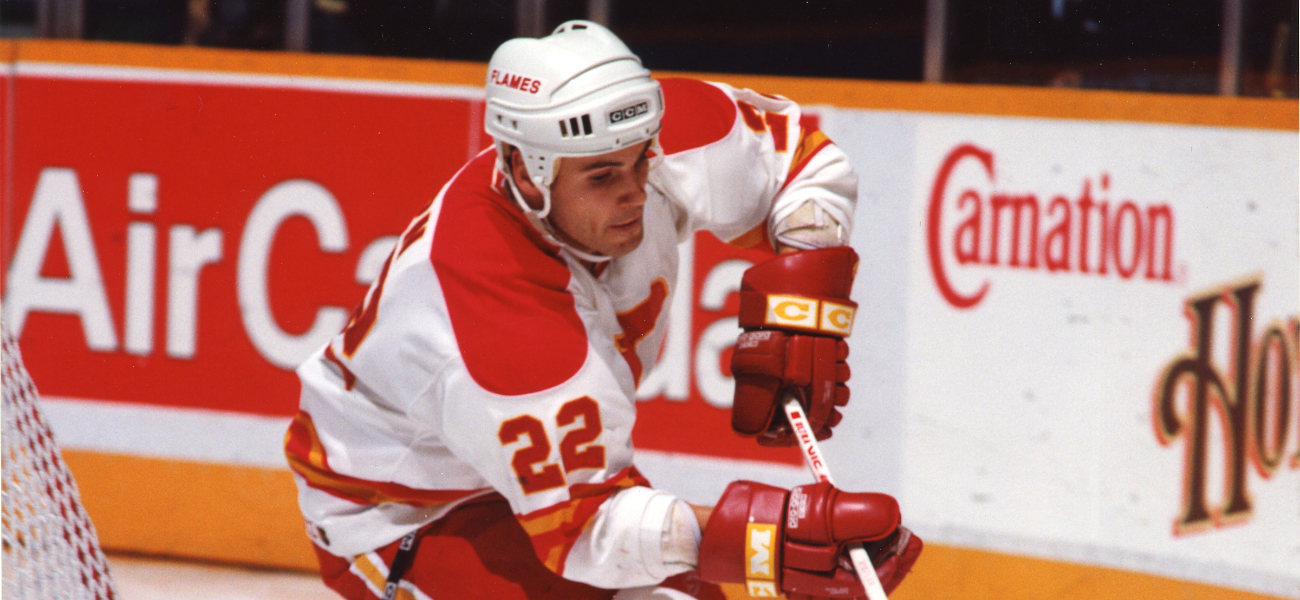Back in the day, so much as the sight of the man on slow simmer was enough to send clammy chills up and down the sturdiest of spines.
Six-foot-3 and 230 pounds of outright ornery. The sock of a shied mule. Like Godzilla, he was, trampling Tokyo underfoot.
“I remember the first time I fought (Bob) Probert,” Ron Stern is reminiscing. “Total accident. He ran me from behind. So I react. I turn around, two-hand him, drop my gloves and then look up.
“Great. It’s Probert.
“I was with the Canucks at the time. I skate by our bench after the fight – wasn’t much of a fight, I just held on for life – and Bob McCammon looks at me and yells: ‘Sternie. Probert. What are you thinking?!
“I go: ‘I didn’t know it was him.'”
Among the most affable and industrious players to ever pass through this town, Stern spent half a dozen seasons in Calgary Flames’ livery, becoming a day-to-day NHLer in the process, one of those heart-and-soul guys sportswriters are fond of waxing poetically about.
A middleweight existing in a heavyweight world.
“I used to laugh,” he says now. “I’d tell Marty McSorley every time he’d beat me up: ‘Hey, Marty. You do know we have bigger and tougher guys on our team, don’t you?’
“Then again, I was running Gretzky. I was running Luc Robitaille. So of course, they’d have to come after me. Marty. Jay Miller.
“If I could run around, play my role and p— enough people off on the ice and their heavyweight has to come after me? I’ll fight him and I have nothing to lose. I may throw two punches and land on the ice. I don’t care. I’ve taken him off, that’s as good as they got.
“So now my teammates have grown an inch and gained 10 pounds.”
Stern is now two decades into retirement, a chronic back issue forcing him out of the game and into the bit, wide, unfamiliar world of
“We get so self-centred on what we have done, what we have been through, our transition,” he reflects.
“Being 20 years later, looking back, things are so much clearer now, so obvious. It’s like your first few years in the league. Everyone asks ‘Did you know this? Did you feel this? Could you see the outside?’
“Hey, you were just existing in a fog.
“I was up from the minors, down to the minors. Travel. Living out of a suitcase. Hotels when you’re up. You survive. You get through it. And it’s great … what can I tell you?”
In hockey, Stern tells you, life was infinitely simpler.
“If you wanted a better outcome, you worked harder. The same and different happens in the corporate world. The bottom people can work very hard but they are pigeon-holed in their role, in what they do. From a corporate standpoint you need those people, want those people, but they will never play a different role.
“In hockey, I could go fight Probert and make an immediate difference. In the corporate world, things happen so much slower.
“That was the biggest transition for me. I wanted to go from the new rookie to someone everyone depends on. Then you realize that’s going to take five to seven years, and that’s with a company who embraces (advancement).”
After passing a U.S. securities course on a first crack, he worked for two years as an investment banker in the Silicon Valley.
“Of course I realized, as you say, “I was ‘starting from scratch’,” he recalls. “What I didn’t recognize at the time were all the intangibles athletes have. Looking back, when my wife created my resume and I looked at her and went: ‘Wow! You did a lot of lying on this resume.’ She said: ‘I’m not lying. It’s everything you’ve learned. Everything you’ve accomplished. All these intangibles that everyone is looking for him in someone they hire, are here.’
“Look, you’re going to need the hands-on training; you’re going to need to learn the technical stuff; you’re going to have to immersed in how a company operates.
“What I didn’t recognize that every company is looking for people with leadership. Well, we already have that. Every company is looking for people who can get along with individuals in a group that maybe you don’t like but will work well with regardless. Well, we have that.
“So I’ve tried to mentor other players, tell them: ‘Hey, guys. If you realize what you do have, you’re actually not starting from scratch, even though you hear you are and you think you are and you’re not going to ask anyone for help because you’re done it all yourself and worked your butt off and don’t want to ask for help … do ask for help. You don’t need to know everything. You don’t have to feel dumb. You can ask for help.
“People genuinely want to help other people, if they ask. Don’t ask, it doesn’t happen, right?”
With the cost of living spiking in San Jose, Stern and Co. returned to Calgary, where he spent 15 years working for Precision Drilling.
“They took very good care of me. They’re friends. They did everything right by me. Gave me every opportunity, to learn, to grow. I was surrounded by good people, great leadership. They moved me around a bit – I did South American sales, lived in Denver running our U.S. sales for four years.
“Great company, one that allowed me to grow and to challenge me while allowing me to utilize my assets in the best way.”
After a couple of years at a software company, Stern is now exploring options.
“I’m tapping into a lot of different environments at the moment, and people are going ‘Hey, did you think about this?'”
The core lessons learned in the game have served Ron Stern well moving into the corporate sector, two decades along. Hey, if a fella can stand up to Bob Probert …
He recalls playing trooping off the ice at Centennial Arena on Crowchild Trail after beer-league game, and a group of eager elite 17-year-olds – their whole hockey careers in front of them – waiting to go on the ice after a flood.
“They notice my San Jose Sharks sweater, at the time, of course, and they kind of look at me and I go: ‘Boys, you enjoy it. Because this is where everyone ends up.’ If you’re lucky.
“That’s reality. Enjoy what you’re doing. When my boys wanted to quit because they were never going to make ‘it’, I said to them: ‘No, you’re going to play hockey for the next 30 years. For fun. You’re going to have relationships and friendships. If you play beer league and win a championship, that might be as good as it gets. And that’s fine.’
“I’m very, very appreciative … of everything. I was like a kid in a candy store the whole time I played. I was having so much fun. Everything’s just going by and everything’s working so there are no issues.
“You’re just living it.
“It’s funny, and you hear it all the time …
“But by the time do you think about maybe sitting back and enjoying it more, it’s already gone.”

